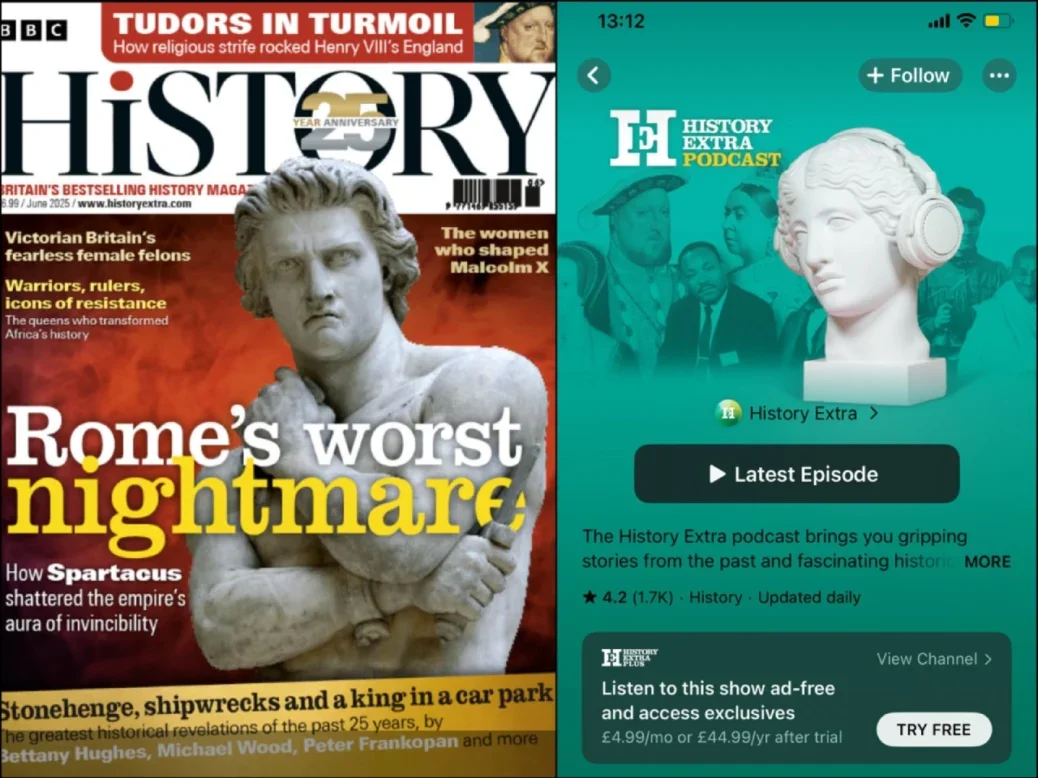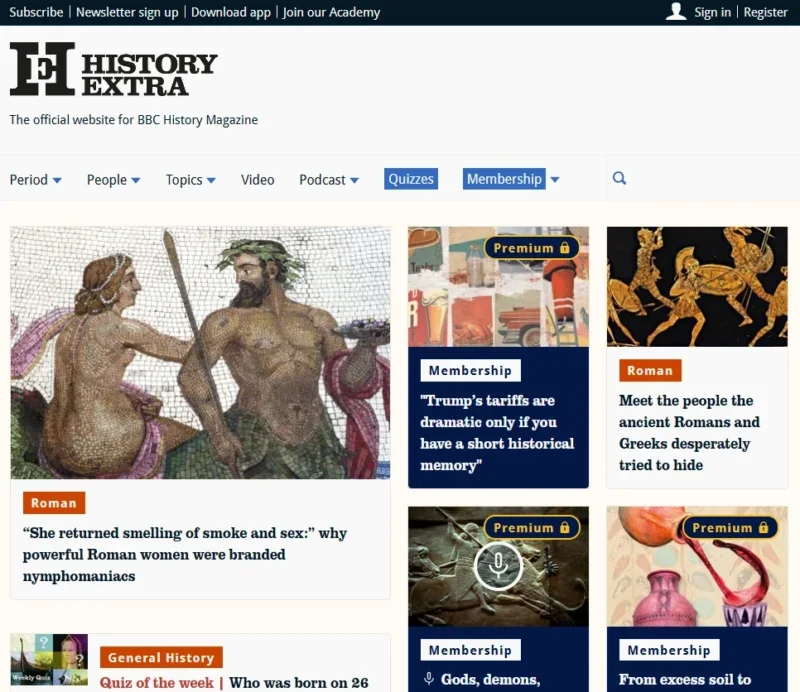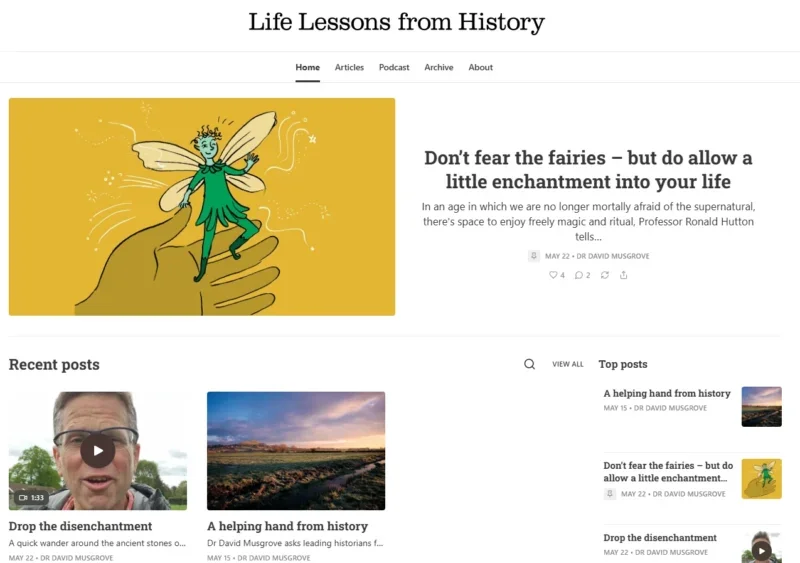
Immediate Media’s BBC History has proved again that it is not living in the past when it comes to current publishing strategies as it has launched a new Substack newsletter and podcast.
The Substack, called Lifestyle Lessons From History, sees Dave Musgrove, content director at BBC History and online brand HistoryExtra, ask historians who we can “live better, happier, healthier, or more productive lives” today.
The output includes a weekly podcast and weekly deep-dive article and is free to all. The content will be repurposed for subscribers on the website and for Apple News.
Musgrove described Substack as a “marketing channel to make people aware of what we’re all about”, similar to social media, and that it could be monetised later on but does not need to be.
“It’s a place where there’s an audience of people who are looking for a certain form of content. We can use that content in our other channels as well… But we’re creating something which we think will work for this area, where there is an audience of people who are looking for long-form reads, and quite often they’re looking for stuff which has a lifestyle, wellbeing type bent in it.”
The Substack launch is the latest in a series of early digital moves for HistoryExtra within Immediate.
History brand ‘driving force’, not ‘dusty’
BBC History launched its first podcast in 2007 and created a paid audio offering with early access and ad-free listening in December 2021. It was also an early adopter of digital editions and Apple News, and is now Immediate’s third biggest brand in terms of social media reach behind Radio Times and Gardeners’ World.
BBC History Magazine and HistoryExtra managing director Jemima Dixon told Press Gazette: “I just think it’s really exciting that a history brand that could be so easily pigeonholed as being a bit niche and a bit dusty actually is really at the forefront and a driving force on some of this stuff.”
She said the history team, which has about 20 people in editorial, “do kind of see ourselves as almost like the incubators for Immediate in that because we are a relatively small team, it does give us that ability to move at pace and agility that maybe some of the bigger parts of the business struggle with because they’ve got so many different things that they’re trying to move forward on…
“That is very much where we like to see ourselves creating the value for Immediate. And I think for our teams, it’s also really motivating and fun, because it means that we’re always going to try our hands at something a bit different, and they get to see their influence in the organisation in ways that go above and beyond our overall commercial scale for the business.”
Digital subscriptions almost at ‘tipping point’ of overtaking print
HistoryExtra began experimenting with paid content in about 2017 when it put in a hard paywall for US users.
Today’s membership includes full website and app access, ad-free podcast episodes, educational courses, video, newsletters, a reward programme, and quizzes. It costs £5.99 per month or £72 per year.

Digital overtook print among Immediate’s more than one million subscribers overall in early 2024. Dixon said the history division specifically has not seen digital overtake print yet but that they are “kind of at that tipping point”.
She added: “We’re sort of on the cusp of thinking about what the next phase of that needs to look like going into 2026 and how actually if our content footprint changes, how does that change the way that we need to think about our subscriptions offering?
“So as we are building audience on third-party platforms, and in particular Apple News, what does that then mean in terms of our subscriptions offer within our owned platform ecosystem, and what’s the interplay between them? Particularly in terms of subscriptions journeys and propositions and where we have engagement. So it’s evolving, it’s building, it’s going well, it’s scaling, and it will scale faster, I think, in the next few years.”
Musgrove said the website has a “really clear content strategy” with two parts: one is the “lead-gen” free part of the site with articles specifically designed to drive organic search to the site.
However, he said they are “thinking about ways that we need to maybe pivot our content a bit to try and find other routes to bring lead gen to the site” due to the threat to referrals from Google’s AI Overviews, especially to non-news content. “A solely search-driven approach is going to be quite a risk going forward.”
[Read more: Google AI Overviews leads to dramatic reduction in clickthroughs for Mail Online]
Part of this pivot is to put out more content that is more news-centred, created from news hooks within podcast interviews or new research, with a view that it might work better on Google Discover for example which is beginning to roll out on desktop as well as mobile.
Musgrove said: “We are not a news organisation, we’re not a news outlet as a history brand. There is some history news, but there’s not that much history news. There’s only so many times someone can find a sword in a bog, and so we don’t have that same access to that sort of stuff. But we can create news ourselves.”
The second part of the strategy is the paid part of the site, which focuses on content “you wouldn’t necessarily get in other places because we’re not playing to the algorithms and we can provide content with a bit more of a human touch to it”.
Musgrove added that they are “trying to build a place where people can come and find really authoritative, credible, trustworthy history, history that they know is delivered by experts and which is not going to be in any way dodgy or not legit, and a wide range of voices as well within that”.
Print will only get ‘even better’
BBC History Magazine in print has just marked its 25th anniversary and Dixon said having a print title remains “really important”.
Most publishers and creators who are their competitors in the history space are digital only, she said, “so for us having a magazine at the heart of it, with the pedigree history and legacy of BBC History, is really important because it just gives us that credibility, authority, real-world presence that really augments the levels of trust that the digital parts of our content mix really benefit from”.
Musgrove added that the next step for print will be “looking to make it even better” whether that’s through adding extra pages or moving to higher quality paper “to really make it a product that you are proud to have on your coffee table”.
BBC History Magazine had an average monthly circulation of 114,967 in 2024. Of this, half was in print while half was digital (largely made up of all-you-can-read products like Apple News which Dixon described as a “pretty significant revenue stream”). Immediate CEO Sean Cornwell told Press Gazette last year Apple News was a seven-figure revenue line for the business (as were podcasting and digital subscriptions).
Like other publishers, BBC History Magazine creates specific content to go on Apple News including an issue of some sort every five days, much of which may be content that is repurposed from another platform. Musgrove said Apple News is a “really interesting place to operate in” because there are human curators to appeal to rather than just an algorithm – this includes putting emphasis on design and making the products look good.
The brand also partners with the likes of Readly and Amazon Kindle but Dixon said this is a smaller focus than previously as Apple News is so dominant.
Dixon noted that Apple News, and other platforms such as Substack, have “already got a user base that may not be our user base. So let’s see what we can do to interest them and invite them into what we do…” BBC History’s Apple News audience is also skewed more towards the US than its other products.
She compared the Apple News audience to the “fly-by customer on the website” who has a “low-level appetite for instant gratification and quick facts”.
The digital subscriptions then offer “deeper engagement and deeper learning” and converting as many users as possible into a more direct relationship is a key aim.
New podcast channels reveal untapped audiences
The HistoryExtra podcast first launched in 2007 and, after various iterations, is currently producing five episodes a week of speaking to historians.
The ad-free, early-access version with exclusive content, first launched at the end of 2021, now costs £4.99 per month or £44.99 a year after a trial. In its earlier days the paid offering was £1.99 a month. Along with advertising, the podcasts are another significant revenue stream (having crossed the £1m mark in 2022).
The next step, Dixon said, will be looking at whether they can integrate the podcast subscription within the main HistoryExtra membership rather than having it separate on Apple Podcasts as it currently is. Currently, website members get access to the same podcasts but have to listen to it in the HistoryExtra ecosystem and can’t on Apple.
Another aim is to make the membership experience around podcasts feel more like being in a club and less like a broadcast by giving members more access to both the interviewees and hosts like Musgrove.
Musgrove said one of the problems of being early to podcasts was that without something new it’s harder to get promoted in, for example, Apple’s podcast carousels and to be taken notice of in industry conversations.
“The way podcast algos work is like, if you launch new products, then suddenly you appear as if you’re the absolute greatest podcast, and you’re sort of penalised for having a legacy,” Musgove said.
They decided therefore to launch new channels alongside the main podcast feed under the “History’s Greatest…” branding, covering, for example, conspiracy theories, cities, scandals and battles.
Musgrove said these are at a smaller scale but are helping the brand to “break out into new audience spaces”. For example, listeners to the series about scandals are overall much younger and more female than the main HistoryExtra feed.
Relating this to the Substack launch as well, Dixon said: “It does suggest that there are audiences out there that we can capitalise on and grow, and it gives us the confidence to think about how else can we stretch this? What are the other areas of content that we could move into?”

Like other teams at Immediate, the history division has also been investing in its video capacity and upskilling its journalists in areas like presenting, scripting, filming and editing. This means, Musgrove said, it is no longer a “daunting proposition to create video content” as it was not long ago.
[Read more: Immediate reports video revenue up 60% since 2022 strategy change]
The brand also had a busy events programme before Covid-19 that got interrupted and they have since run tie-ups with other history events across the UK. But they are now doing their own events again this year including an “In Conversation” with Tom Holland and Mary Beard in Kew, West London in September (other days have line-ups from sister brands Radio Times, BBC Gardeners’ World and BBC Countryfile Magazine).
Dixon said that with everything they have underway, “it’s all to play for. There’s so many exciting opportunities for us to think about… for us the next few years are taking that confidence and just pushing it that much further and seeing how else we can bring that to life. It’s not a question of standing still and consolidating, it will always be about where next?”
Email pged@pressgazette.co.uk to point out mistakes, provide story tips or send in a letter for publication on our "Letters Page" blog
